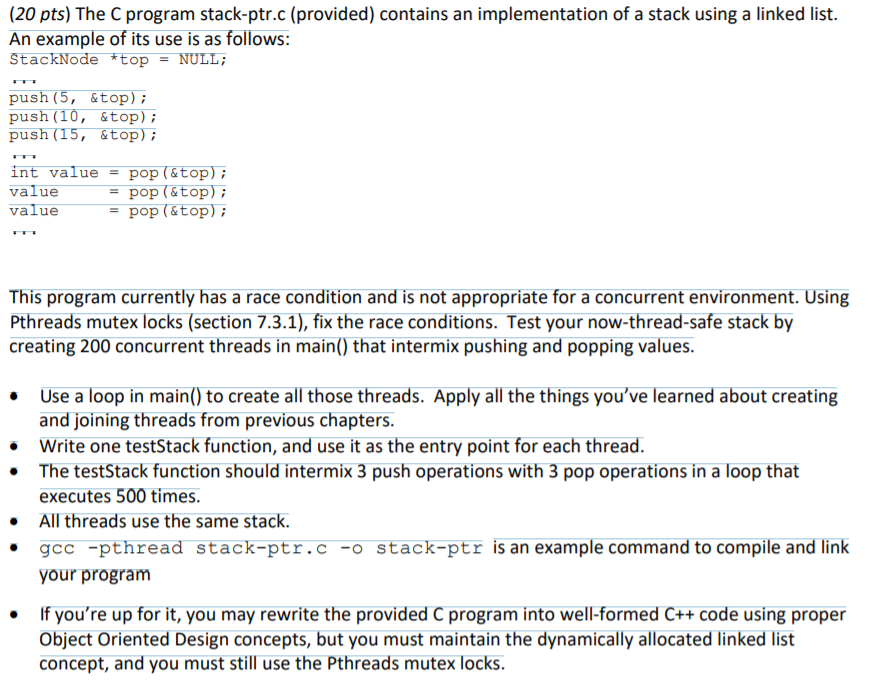Question
write a program given the following instructions and goal. at the bottom is a skeleton code to get started. It may need to be changed
write a program given the following instructions and goal. at the bottom is a skeleton code to get started. It may need to be changed to implement threads. Its a starting point so modify for thread usage using C language

/* * Stack containing race conditions */
#include
#include
#include
// Linked list node
typedef int value_t;
typedef struct Node {
value_t data;
struct Node *next;
} StackNode;
// Stack function declarations
void push (value_t v, StackNode **top);
value_t pop ( StackNode **top);
int is_empty( StackNode *top);
int main(void) {
StackNode *top = NULL;
push(5, &top);
push(10,&top);
pop ( &top);
push(15,&top);
pop ( &top);
pop ( &top);
push(20,&top);
push(-5, &top);
pop ( &top);
push(-10,&top);
pop ( &top);
pop ( &top);
push(-15,&top);
pop ( &top);
push(-20,&top);
return 0;
}
// Stack function definitions
void push(value_t v, StackNode **top)
{
StackNode * new_node = malloc(sizeof(StackNode));
new_node->data = v;
new_node->next = *top;
*top = new_node;
}
value_t pop(StackNode **top)
{
if (is_empty(*top)) return (value_t)0;
value_t data = (*top)->data;
StackNode * temp = *top;
*top = (*top)->next;
free(temp);
return data;
}
int is_empty(StackNode *top) {
if (top == NULL) return 1;
else return 0;
}
(20 pts) The C program stack-ptr.c (provided) contains an implementation of a stack using a linked list. An example of its use is as follows: tackNode *top push (5, &top); &top) pus , &top); pus value pop (&top) pop (&top) pop (&top) value value This program currently has a race condition and is not appropriate for a concurrent environment. Using Pthreads mutex locks (section 7.3.1), fix the race conditions. Test your now-thread-safe stack by creating 200 concurrent threads in main() that intermix pushing and popping values. Use a loop in main() to create all those threads. Apply all the things you've learned about creating and joining threads from previous chapters Write one testStack function, and use it as the entry point for each thread. The testStack function should intermix 3 push operations with 3 pop operations in a loop that executes 500 times. All threads use the same stack gcc -pthread stack-ptr.c-o stack-ptr is an example command to compile and link your program If you're up for it, you may rewrite the provided C program into well-formed C++ code using proper Object Oriented Design concepts, but you must maintain the dynamically allocated linked list concept, and you must still use the Pthreads mutex locks (20 pts) The C program stack-ptr.c (provided) contains an implementation of a stack using a linked list. An example of its use is as follows: tackNode *top push (5, &top); &top) pus , &top); pus value pop (&top) pop (&top) pop (&top) value value This program currently has a race condition and is not appropriate for a concurrent environment. Using Pthreads mutex locks (section 7.3.1), fix the race conditions. Test your now-thread-safe stack by creating 200 concurrent threads in main() that intermix pushing and popping values. Use a loop in main() to create all those threads. Apply all the things you've learned about creating and joining threads from previous chapters Write one testStack function, and use it as the entry point for each thread. The testStack function should intermix 3 push operations with 3 pop operations in a loop that executes 500 times. All threads use the same stack gcc -pthread stack-ptr.c-o stack-ptr is an example command to compile and link your program If you're up for it, you may rewrite the provided C program into well-formed C++ code using proper Object Oriented Design concepts, but you must maintain the dynamically allocated linked list concept, and you must still use the Pthreads mutex locksStep by Step Solution
There are 3 Steps involved in it
Step: 1

Get Instant Access to Expert-Tailored Solutions
See step-by-step solutions with expert insights and AI powered tools for academic success
Step: 2

Step: 3

Ace Your Homework with AI
Get the answers you need in no time with our AI-driven, step-by-step assistance
Get Started


